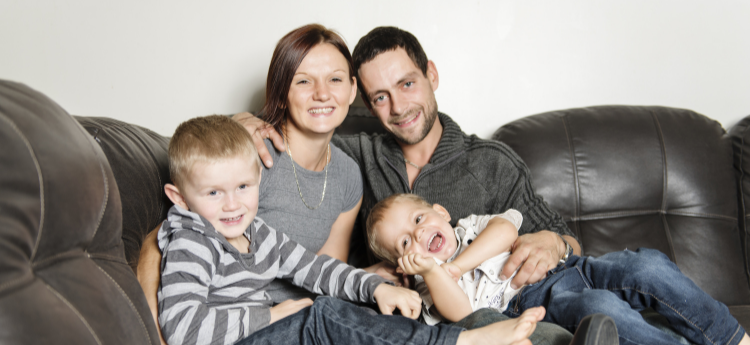For families who have children and teens (up to age 21) who are struggling at home, school or in the community due to emotional and behavioral difficulties, Sacramento County offers Flexible Integrated Treatment (FIT) programs.
FIT provides mental health outpatient services that are flexible, child-centered, and family-focused to meet the individual needs of high-risk clients and, when appropriate, stabilizing services are provided to their families. The type and intensity of services can range from basic outpatient to more intensive services and could include family housing assistance services to stabilize living situations.
Through a planning process, a counselor works in partnership with the family to create a plan to meet their goals for mental, emotional and behavioral health. Each plan is unique and is built upon the family’s strengths, values and culture.
Services include individual, family and group therapy, psychiatric supports, in-home, school and community behavioral supports, skill-building, crisis intervention, after-hours crisis support, extended service hours, advocacy, and case management. Community resources are also utilized to help sustain the needs of the family.
In March 2020, the Sacramento County Department of Health Services expanded their Mental Health Services Act (MHSA) funding to support the children’s FIT programs. In addition to mental health outpatient services, this expansion allows for FIT programs to incorporate temporary, short-term homelessness interventions, for families in Sacramento County. The funding helps with “barrier-busting.” Sometimes, just a little assistance helps families end their homelessness or prevents families from losing housing and are able to then focus on providing a supportive environment to reach mental, emotional and behavioral health goals.
Between March 2020 and December 2020, 100 families in the FIT program also received housing rental assistance, including help with paying some of the rent due to income loss. This was particularly helpful for families who lost their job or had their hours cut back due to the impacts of COVID-19. Twenty-two families with unsecure housing got help with security deposits, while other families received help with overdue utilities. These were the only barriers to preventing or exiting homelessness, and we were able to help.
A Sacramento County FIT provider shares their experience helping a family:
“We began working with this family when the caregivers were homeless, and the children were all in foster care, which affected everyone’s mental health and wellness. The only thing keeping the family apart was that they needed to be housed,” said Amanda, a Behavioral Health Specialist. “We started working with one of the youth. Although she was always excited to be around her treatment team, the youth had difficulties sitting still and displayed impulsive behaviors. We taught her different relaxation skills to calm her body. The youth also worked with the treatment team to learn skills related to problem-solving and choice development so the youth could listen better, make better decisions with siblings, and follow directions.”
Amanda spent a lot of time coordinating with the school to ensure the youth was receiving the appropriate educational accommodations to help her succeed, even through distance learning. Amanda also worked with the caregiver on further resource development, as well as strengthening the caregiver’s already strong parenting skills. The youth made improvements through therapy by practicing skills, as well as the caregiver practicing of reinforcing and consequence skills.
Besides mental health services, housing and resource support have been crucial in determining stability for the youth, allowing her the space to feel safe and continue to utilize skills learned in sessions.
“After working with a rental company, we paid the deposit and first month’s rent to get the family into an apartment. We were able to reassure the rental company that we would work with the family to make sure that the rent was paid, and they agreed to allow them to move in,” said Amanda. “Since moving in, the family has been able to make their rent on their own except for one month where they needed partial assistance due to dad missing hours at work due to illness. The children are all home and doing well. We have also assisted them in accessing food drives.”
The caregiver is reporting lower stress levels and the household, although still full and a bit busy at times, is more manageable and happier. They are very happy to be reunited and all living under the same roof and it shows in the youth’s ability to manage in all areas of her life.
A family shares their experience with FIT:
“I have had an excellent experience with the program as they provided me the support to get into an apartment so that my children were able to leave the CPS system and be reunited with us,” said a FIT participating family member. “Our FIT workers have been really helpful. Jenise has helped us to connect with resources for furniture, food, utility assistance programs and other community supports that have been helpful. I appreciate Amanda who has been a major support with providing my family with weekly food drops. Also, Meghan who has helped our children to manage with the stress of the whole situation. I believe the agency has been very supportive in our success and road to recovery as a family.”
“The biggest way I think the agency has helped our family was by helping us to fund the move-in costs to secure and keep our housing during the COVID-19 situation. I would definitely recommend the program and I already have and will continue to in the future.”
If you or someone you know would benefit from mental health services, please visit the Sacramento Child, Youth, and Family Mental Health Programs Website or call 916-875-1055 for a free mental health screening for services.














